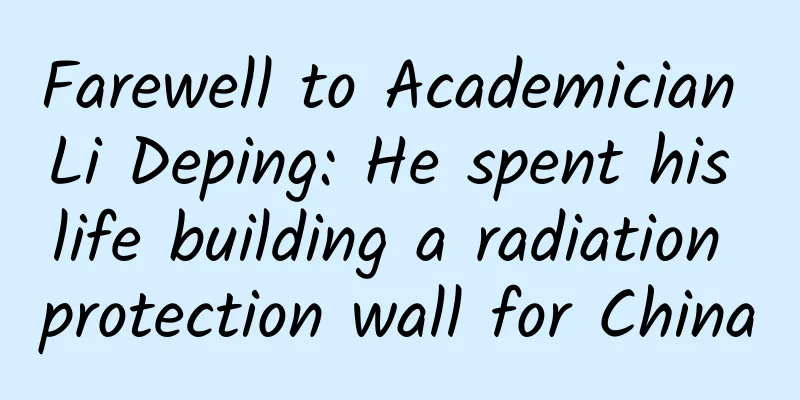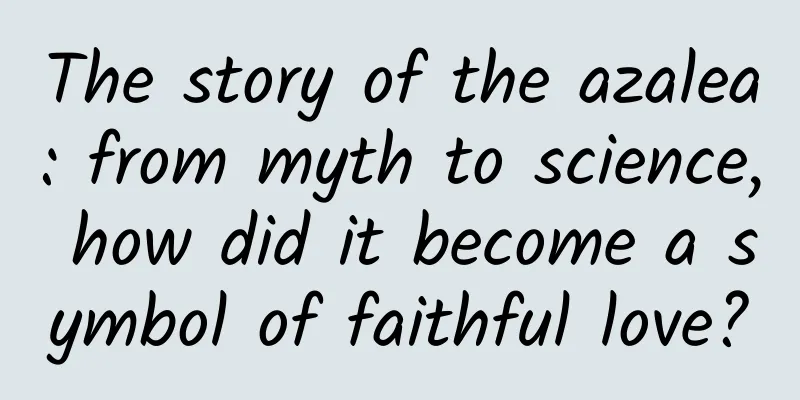Farewell to Academician Li Deping: He spent his life building a radiation protection wall for China

|
On the evening of March 16, the China Institute of Radiation Protection issued an obituary: Li Deping, academician of the Chinese Academy of Sciences, winner of the China Nuclear Industry Medal of Merit and the National Science Conference Award, member of the 6th, 7th, 8th and 9th National Committee of the Chinese People's Political Consultative Conference, one of the main pioneers and founders in the field of radiation protection in China, internationally renowned radiation protection expert, former president and honorary president of the China Institute of Radiation Protection, died in Beijing at 17:52 on March 16, 2025 at the age of 99 due to illness. Father and son are academicians, Li Deping's bumpy road to study Li Deping was born in Beijing in November 1926. His ancestral home is Xinghua City, Jiangsu Province. His father , Li Jitong , studied at Tsinghua School (the predecessor of Tsinghua University) in the United States. After studying in the United States, he received a Ph.D. in Forestry from Yale University. He was a famous botanist and forester. After returning to China, he taught at Nankai University, Southwest United University, and Tsinghua University. In 1955, he was appointed as an academician of the Chinese Academy of Sciences . Li Deping spent his childhood in Tsinghua University. Influenced by his family and environment, he showed a love for books since he was a child. He was curious about the things around him and always asked why. So his father subscribed to Science Pictorial for him to read . At that time, many well-known scientists were special contributors to this journal. This journal full of new ideas and new concepts was the must-read book that young Li Deping looked forward to the most, and this may have planted the seeds of constant questioning on the road of science in his heart . When the Anti-Japanese War broke out, Tsinghua University was forced to move to the southwest and the school was closed. Li Deping, who had not yet finished primary school, had to return to Xinghua, Jiangsu with his family and continue to study at Kaiyuanguan Primary School in Xinghua County. A year later, he entered Xinghua County Junior High School. Due to the war, he had no place to study and did not attend a full semester. In the third year of junior high school, Li Deping followed his fourth aunt Li Huiying to the relocated Yangzhou Middle School in the French Concession in Shanghai, but he only attended for less than a semester. The Pearl Harbor incident broke out, Japan occupied the concession, and Yangzhou Middle School was closed, so he had to return to Xinghua. ▲Li Deping in his youth with his parents and two sisters at the West Campus of Tsinghua University The elders of the family were all intellectuals who knew the importance of education and knowledge for growth. They jointly invited some scholars who had taken refuge in Xinghua at the time and knowledgeable people in the family, and each family contributed money to gather the children in the family to study high school courses. After finishing high school in Xinghua, Li Deping and his brothers went to Kunming to seek refuge with his father, Li Jitong, who was then the director of the Department of Biology at Southwest Associated University. Li Deping and his group set out from Jiangsu, passed through Anhui and then to Jiangxi, and arrived in Yunnan half a year later. As Li Deping did not catch up with the college entrance examination, he had to study in the preparatory class of Southwest Associated University. Due to his excellent grades, Li Deping was recommended to the Department of Physics of Southwest Associated University a year later. When he graduated in 1948, many graduates chose to study abroad. He had the opportunity to study in the United States, but Li Deping did not choose to go abroad. Instead, he listened to his father's teachings and gave up the opportunity to study in the United States and stayed in China to conduct nuclear physics research. He believed that China's future needed talents and he had the responsibility to do his best to build a new China . With this patriotic belief, he firmly stayed. Make do with what you have and overcome the "core" difficulties In May 1950, the Chinese Academy of Sciences established the Institute of Modern Physics (later renamed the Institute of Atomic Energy), with the famous nuclear physicist Qian Sanqiang as deputy director. Soon after the establishment of the institute, Qian Sanqiang went to Tsinghua University to look for talents. The then president Zhou Peiyuan recommended Li Deping to him. Qian Sanqiang believed in President Zhou's vision and gladly accepted him. In January 1951, Li Deping was officially transferred to the institute and was assigned to work in the detector group headed by Qian Sanqiang. He began to engage in the research and development of radiation detectors to fill the gap in this field in my country. Qian Sanqiang once said: "To eat bread, you have to start with planting wheat. To develop atomic energy, you have to start with building detection instruments." This shows the importance of radiation detector research and development in the development of the nuclear industry. At that time, the new China had just emerged from the war. There was a lot of work to be done, materials were scarce, and scientific research conditions were very difficult. Many instruments and equipment had to be made by themselves. Among them, the single-stage mercury diffusion pump used for radiation detectors was one of the important equipment. Its production required glass blowing. There were no professionals in this field in the group. Li Deping, who had strong hands-on ability, volunteered to use the glass blowing skills he learned in college and found the original tool "Leather Tiger" to replace the vacuum compressor. Under the high-temperature fire source generated by gasoline, after repeated experiments, ordinary flat-bottomed glass flasks were burned into single-stage mercury diffusion pumps. In this process, Li Deping's sense of responsibility and skills were highly praised by veteran scientists such as Qian Sanqiang . Soon after, Wang Ganchang, a nuclear physicist who was ordered to investigate whether the U.S. military used atomic weapons and dropped radioactive materials on the Korean battlefield, returned to China after completing his mission. After reporting to his superiors, his superiors gave the institute a special task, requiring it to develop a portable radiation detector to identify whether the U.S. military used nuclear weapons on the Korean battlefield. Dai Chuanzeng, a nuclear physicist who had returned from studying in the UK and replaced Qian Sanqiang as the head of the detector group, immediately thought of Li Deping after receiving the order and asked him to complete the task with him. They started from scratch, overcoming the blockade of Western literature, the lack of available information, and the poor experimental conditions. They exerted their intelligence and worked hard on the production process. If it didn't work once, they would summarize and improve it and try again, and keep on testing and improving. Sometimes the tools needed for improvement were not available in the laboratory and difficult to buy on the market, so Li Deping made them himself. During that time, he spent almost every day in the laboratory. Finally, he solved a series of technical and technological problems and developed my country's first portable radiation detector with international advanced level at that time. This research result won the "Third Prize of Science Fund" of the Science Award Committee of the Chinese Academy of Sciences in January 1957. After the successful development of the radiation detector, Li Deping and Dai Chuanzeng worked together to tackle the problem of electronic device counter tubes (also known as radiation counters) that convert incident particles or rays into electrical pulses, and developed a boron trifluoride neutron counter tube with good performance. The radiation detectors and counter tubes developed by Li Deping have provided indispensable measurement means for uranium exploration and mining, neutron physics experiments, nuclear weapons development, nuclear testing, and armed chemical defense troops in my country's nuclear industry, laying the foundation for my country's independent research and development of nuclear weapons and nuclear reactors. Devoting ourselves to scientific research and developing China's protection industry "Protection comes first before production starts." While conducting uranium geological exploration, nuclear science research and nuclear industry construction, how to prevent nuclear radiation hazards has been put on the agenda. ▲In the 1970s, Li Deping was doing experiments outdoors In 1962, China's first production heavy water reactor 101 was completed. The leaders asked Li Deping to assist in completing the environmental measurement around the reactor. At that time, there were no ready-made mobile environmental monitoring instruments. Li Deping borrowed a jeep as a mobile platform for the aerosol sampler, and then equipped it with a generator, solving the "mobile monitoring" problem and obtaining first-hand environmental monitoring data. After that, he organized the design, trial production, installation and commissioning of the zero-power reactor dose monitoring system, which was my country's first dose monitoring system designed, developed and put into operation. On October 16, 1964, my country successfully tested its first atomic bomb. Li Deping, director of the Radiation Physics Laboratory of the Institute of Industrial Hygiene, selected elite personnel to participate in the measurement of radiation doses at the atomic bomb explosion site, obtained a large amount of experimental data, calculated the changes in ground radiation levels over time in the radiation contaminated area after the nuclear explosion, compiled a manual in the form of tables, and provided a basis for radiation safety management of chemical defense troops. In the early days of mine protection, only radon was measured without measuring daughters, and the measurement results could not accurately reflect the impact on the health of miners. Li Deping organized a special research group to study the problem of radon measurement and published the article "Calculation of Detector Geometric Factors under Range Limitation", which won the 1978 National Science Conference Award. In 1980, Li Deping developed a field effect tube electrometer. This instrument was uniquely designed and manufactured. The instrument casing and electronic components were all made and welded by him personally. The instrument had a good, flexible and reliable grounding device to protect the field effect tube from damage. ▲In 1984, Li Deping accompanied the chairman of the ICRP committee and others to visit the laboratory of the China Institute of Radiation Protection After the reform and opening up, Li Deping actively established and strengthened the connection and communication between China's radiation protection community and the international community, and held important positions in important international organizations, playing an important role in promoting the development of China's radiation protection cause. In 1985, Li Deping was appointed as a member of the International Commission on Radiological Protection (ICRP) and was re-elected for three terms. From 1987 to 1992, he served as the Chinese representative to the United Nations Scientific Committee on the Effects of Atomic Radiation, and from 1988 to 1992, he served as a member of the International Nuclear Safety Advisory Group of the International Atomic Energy Agency. In 1991, he was elected as an academician of the Chinese Academy of Sciences. The personality is sincere and shows everyone's personality charm Li Deping has been working silently to ensure that China's radiation protection cause has successors. He once said: "There is only one thing in the world that will not diminish if you give it to others, and that is knowledge. " When he first established the North China Institute of Industrial Hygiene (now the China Institute of Radiation Protection), he paid attention to setting up appropriate scientific research topics and selecting a group of hardworking, down-to-earth, and independently capable young and middle-aged talents to shoulder the heavy responsibility. It is because of people like Li Deping that some young talents who have only worked for a few years can be discovered, independently produce scientific research results, and participate in academic conferences organized by the ministry. Li Deping has been quietly encouraging the new generation of young people, giving them opportunities, and providing many key guidance for some important projects that later won awards. He always shared his insights and achievements without reservation, and tried his best to provide students with opportunities to study and research. In the early days of reform and opening up, he sent a group of experts and scholars abroad to participate in international scientific and technological exchange activities; when he was the editor-in-chief of "Radiation Protection", he regarded the revision of manuscripts as a way to improve academic standards, and carefully reviewed and revised manuscripts for the magazine. As a teacher, he opposed sensationalism and boasting. In life, he was approachable and always cared about everyone's food, clothing, housing and transportation. Until his old age, he was full of infinite curiosity about new things. After the Internet became popular, Li Deping would search for his old classmates on the Internet; he taught himself programming and drew the corresponding graphics; before the software editing technology was fully popularized, he had already learned how to use software to perfectly integrate his grandson and a giraffe in a photo. Mourn! Farewell! Academician Li Deping! Source: CCTV News Client, China Science Daily, China Institute of Radiation Protection, China Nuclear Industry |
<<: The gray magpie is not actually a gray magpie?
Recommend
Interesting fact: Was steamed bun invented by Zhuge Liang?
Steamed buns were invented by Zhuge Liang In the ...
A must have! 18 hot spot tracking tools for marketing and promotion operators!
"Chasing hot topics" is a common practi...
These symptoms on your feet actually indicate that your blood sugar has been above the normal level for a long time? Doing these two things can reverse it!
Well-known Diabetes is becoming more and more com...
INSIDEEVs: Tesla ranks first in pure electric vehicle sales in Q2 2022 with 250,000 units
Foreign media INSIDEEVs released the sales data o...
For Dragon Boat Festival brand marketing, Weilong actually launched spicy rice dumplings!
When it comes to brands that catch on to hot topi...
Google Maps app update: COVID-19 reminders added to Android and iOS versions
Although the COVID-19 epidemic caused by the new ...
Great Wall will launch fuel cell vehicles in 2020 and will launch the first fuel cell fleet at the 2022 Beijing Winter Olympics
Recently, Great Wall Motors held a Great Wall New...
What is the approximate price of customized mini programs purchased online? What factors are related to the price of customized mini programs in Zhuhai?
In order to ensure that the developed mini progra...
Are you a modern person who has been deeply “kidnapped” by WeChat?
Mary Meeker, a Wall Street securities analyst kno...
Tencent Silicon Valley recruits to build an autonomous driving R&D team
According to foreign media reports, Tencent recen...
How to do influencer marketing? Share 9 tips!
Recently, due to the popularity of short video ap...
【Practical】General process for online event operations!
There is no clear definition of operation and spe...
The entry threshold for new energy vehicles has been raised, requiring companies to earn "patient money"
Recently, the "Automotive Industry Investmen...
Where can I find the short video material library for self-media short video production?
As a popular platform nowadays, short video platf...
What does the information flow advertising model mean?
Information flow advertising refers to a form of ...









